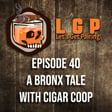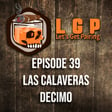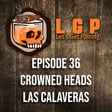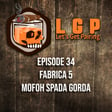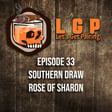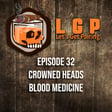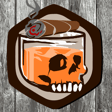Become a Creator today!Start creating today - Share your story with the world!
Start for free
00:00:00
00:00:01

LGP 35 - Rojas Street Tacos Cindo de Mayo
This week, we're pairing with the 2024 Cinco de Mayo edition of the Rojas Street Tacos!
Transcript
Episode Introduction & Rojas Street Taco Cinco de Mayo
00:00:16
Speaker
everybody Welcome back to Let's Get Pairing This is episode 35 Right? 35? Yeah it's 35 Rojas Street Taco Cinco de Mayo Check that out Look at that cool band We'll get into it. Look at how good their logo looks next to ours.
00:00:34
Speaker
um We'll get into to the cigar and the pairings that were going along with it, but for now, yeah grab yourself a cigar, grab yourself a drink, let's get pairing.............
00:01:09
Speaker
You do it at the end the show, not the top of the show. That's true. No, I usually do it at the at the top of the show, too. Hey, everybody. Welcome back.
Tampa Cigar Bash Experience
00:01:18
Speaker
I'm your host, Tripp. This is Let's Get Pairing, episode 35.
00:01:21
Speaker
I'm here in the Casa de Monte Cristo studios, which I got to give a little shout out to Casa de Monte Cristo. and went up to Tampa yesterday and went to the Tampa Cigar Bash, which is a ah ah big event that... and it was it was pretty cool um it's a big event that casa de monte cristo throws uh every year at the hard rock in tampa um so it's kind of kind of cool half half in indoors half outdoors um it's kind of a it's a sales event for the most part so if you're looking for uh some deals it's a good place to go but the ticket includes like uh
00:02:01
Speaker
oh A bag of cigars bigger than my head. So...
00:02:08
Speaker
ah Worth the price of admission. Comes with a couple drink tickets. I got to see some peoples there.
Meeting Southern Draw: New Releases
00:02:14
Speaker
Got to see... a ah Robert and Sharon Holt from ah wow Southern Draw, which was a nice little throwback. Haven't seen that in a couple years.
00:02:24
Speaker
and Got to catch up a little bit. Man, I'm excited about some of their new stuff coming. I don't know how much I'm supposed to say, but they have some cool new stuff coming out ah sometime in the near-ish future.
00:02:36
Speaker
um Got to catch up a little bit with Derek from Black Label Trading Company, with ah Sean Williams from Cohiba. i love Sean. Yeah, Sean's great. It was good to see him.
00:02:48
Speaker
um Among a couple other people um that I'm not remembering. Oh, Richie from Espinosa was there. um Got to hang out with Joe Groh, of course, from Casa de Monte Cristo.
00:03:00
Speaker
And it was a good time. So I definitely recommend going if you have the chance. um Yeah, so get some good deals, get some big old pile of cigars and some swag.
00:03:12
Speaker
Get it for you. Anyway, ah as always, I'm here with my co-host Dennis.
Concert Excitement: Reverend Horton Heat
00:03:17
Speaker
Dennis, how are you doing tonight? Hey, hey, I'm fantastic, man. I'm so jazzed. I'm coming off of this excitement last night seeing Reverend Horton Heat play with the Coffin Cats and Big Sandy, which we'll get into later in the show. But man, I'm I'm feeling good. It's been a great weekend. And what better way to ah kind of finish the weekend off with a street taco? Because I'm a huge fan.
00:03:40
Speaker
Super fan. Full disclosure. I've loved these cigars for so long. You are definitely a super fan of Rojas Street Tacos. So but but that's a good
Street Tacos Brand Origins
00:03:50
Speaker
segue. Let's kick it off and get into the cigar a little bit before we start talking pairing and stuff.
00:03:54
Speaker
um So this is the Street Tacos Cinco de Mayo edition. um So Street Tacos are kind of a... It was kind of just a small brand that Noel Rojas launched um when he created his new factory couple of years ago in 2020, I believe, 2021, maybe.
00:04:11
Speaker
Might have been a little before that. Might have been 2019. Um, but he started the street taco series with a Sumatra a couple years later, he came out with a Connecticut. And then think it was last year or earlier this year that the breakfast tacos came out, which came in the original two wrappers plus a Maduro.
00:04:29
Speaker
Um, and this is his first kind of annual limited edition for the brand. Um, And street tacos have really become like what he's known for, which is, it's one of those things where like, you know, you make a cigar and you're not expecting it to become your core brand.
00:04:47
Speaker
But that's what this brand did for him. um So that there, you see these all over the place. ah This one is a limited edition six by 50 Toro. um We are expecting to see this, ah the the Cinco de Mayo edition come out every year.
00:05:03
Speaker
I don't know if they've said whether it's going to be the same blend or the same size um or what's going to change every year. ah But we'll see. We'll see in the future.
Cigar Details: Wrapper and Fillers
00:05:14
Speaker
ah For now, what we're smoking is an Ecuadorian Habano wrapper over a Mexican San Andreas binder with fillers from Nicaragua and U.S., which ah none of none of the press releases I found or anything said what the U.S. tobacco was, but I'm guessing Connecticut or Pennsylvania.
00:05:31
Speaker
ah More likely Pennsylvania these days. Production of these was limited to 35,000 cigars. um So they're out there, but they're pretty they're not easy to find right now.
00:05:42
Speaker
um If you want them, try to get your hands on them soon. and MSRP is about 12 bucks. We just lit them up. So Dennis, what are you thinking of the Cinco de Mayo so far?
00:05:54
Speaker
There's a really nice bit of spice to it, but it's not when when we say spice, I think in this case, it's much more subdued spice where we say, I think this is a mix between baking spice and the classic black pepper that we talk about in a lot of cigars. so Yeah, it's definitely got a little of each.
00:06:08
Speaker
Yeah, it's kind of rounder. And yeah when we talk about spice, I think ah a good way to put it is it's it's a little bit rounder than normally what you experience where spice will hit you hard. It's fast. It's dry.
Cigar Flavor Profile
00:06:19
Speaker
It's to the point. It's almost astringent. I may put it that way. um In this case, it's much rounder. It's it's a little softer spice. I really like it. And I just lit the cigar. so I'm hoping in the next five, 10 minutes, it it's going to transition a little bit to a, um,
00:06:36
Speaker
kind of a fuller spice in the sense of of a little bit more of a wet kind of the profile on the palette. I'm finding for me it has a lot of those... Those flavors that i always talk about that I can't quite put my finger on, but I always refer to it as like the the crust of a steak, like that sweet umami yeah yeah kind of flavor. This has a lot of that, which I'm really enjoying. I love that kind of flavor, and it can be harder to find. and There's a surprising bit of sweetness on this.
00:07:05
Speaker
Very surprising bit of sweetness. It's very much that like, well, actually, Oktoberfest season is just wrapping up, and the skin of pretzels
00:07:18
Speaker
large Bavarian pretzel. It's got that little bit, you know what talking about, a little bit of bitterness, a little bit sweetness that that almost char. I know exactly what you mean. yeah It's almost like the skin of a pretzel.
00:07:31
Speaker
Man, that's a very specific tasting note. um Sam says he's had several of street tacos and he loves them. I would definitely recommend the Cinco de Mayo. You can get your hands on some of these.
00:07:43
Speaker
um How do you think it compares to the so the the Sumatra, Dennis? so i You know what? I find this to be a lot sweeter and a lot softer in character compared to the Sumatra. For me, at least my at least the way that I smoke, again, I smoke very fast.
00:07:57
Speaker
It's not the best kind of example, if you will. But I like the sweetness, and I can see something like this being a little bit more little more friendly to pairings.
00:08:09
Speaker
Yeah. um To me, it's got kind of a Corojo-y kind of sweetness. Oh, yeah. It reminds me of that, like, intense, um almost creamy sweetness that you get from Corojo, which, you know, I love me some Corojo.
00:08:27
Speaker
I love that sweetness. um All right. So we have a slightly, we have a time limit on our show, which isn't something we usually have. um So we're going to get right in into the pairing here. Now we've talked a little bit about the cigar.
00:08:38
Speaker
Yeah. Dennis, you we're talking in the green room and I think we may have, uh, at least one similar pairing tonight. I suspect they had a feeling about this. So, uh, I'm going to introduce my first pairing. I will see if it's maybe your first or your second or your third pairing, uh, maybe down the line, keep it on, keep it on, on the wraps. If that's what you feel like
Hofbrau Oktoberfest Significance
00:09:00
Speaker
doing. If not, we can, we can hit it all at once.
00:09:03
Speaker
Um, Let find my notes here. right. So my first pairing, it's going to Hofbrau Oktoberfest beer. God damn it.
00:09:15
Speaker
You said Hofbrau, and I was like, well, I already poured that. um All right. Hofbrau. Hofbrau has a way more interesting history than I ever knew. It's amazing. I always assumed it was just an old German brewery.
00:09:29
Speaker
Also true. I mean, that is true. It was it was founded in 1589, which classifies as a very long time ago. um But it not just that, it was founded, well, it was commissioned, rather, by the Duke of Bavaria.
00:09:46
Speaker
um And it has always been the state-owned government brewery in Munich, Germany, formerly Bavaria. If I'm not mistaken, yeah?
00:09:57
Speaker
Yes, Wilhelm V founded it ah And he did it because Importing beer was getting too expensive He was like I'm spending all my money on this Beer from North Germany I need some Bavarian beer.
00:10:12
Speaker
So you guys going to make it for me. And he created his own. yeah i mean, he had them create a brewery that was owned by the state. um Ever since then, it's been owned by the state.
00:10:23
Speaker
um That kind of transitions into I did a little bit of ah research on the Ryan Heights go about because we talked about it last week. with a little bit of speculation.
00:10:36
Speaker
Um, as we know, it was adopted in 1516, but it was adopted only in Bavaria. Um, yeah it wasn't until much later when Bavaria war, when Germany unified, um, that the Bavarian government really pushed to have it adopted by German law.
00:10:52
Speaker
Um, and it was, so this is kind of where that came from. Um, since this is the oldest, uh, brewery in Bavaria. Um,
00:11:05
Speaker
All right. Another really interesting thing I found was in the 17th century. So this was like 200-ish years later, 150 maybe. um Duke Maximilian I was not a big fan of the dark beers that Hofbrau was making at the time.
00:11:23
Speaker
ah So he basically said, you guys are going to stop making dark beer. You're going to start making wheat beer because that's what I like. but also it's illegal for anybody else in Bavaria to make wheat beer.
00:11:37
Speaker
So you guys are the only ones making it, ah which I think is pretty, pretty bold,
Oktoberfest Origins & Traditions
00:11:43
Speaker
right? Well, it's bold on one side. You have to understand that at the time, the production of wheat was, it was a big deal.
00:11:51
Speaker
It was a huge, massively huge moneymaker. and Wheat was a big deal. And if you can nail a business down that consumed the wheat that was produced officially by the state at that point, right? The state was really pushing wheat.
00:12:03
Speaker
in a big way. um They were trying to get as many people as they could into, hey, this is a wheat thing. This is what you need to do. um We have the resources here. Take them, do something. We're going to put our name on it.
00:12:15
Speaker
If you use our wheat, we're going to put our name on it. And it was one of those political power moves that ended up being economically very viable for everybody. Yeah. um One of the other really interesting things about Hofbrau is that since it is state-owned,
00:12:31
Speaker
ah Over the many, many years that it was um that it was Bavaria rather than just part of Germany, ah it basically financed the whole country.
00:12:43
Speaker
Oh, yeah. When it was Bavaria. like um I was reading that at some point in its history, 60% of the gross income of the country was exporting Hofbrau.
00:12:57
Speaker
So that's where like they were fighting wars with the money with beer money. Which is hilarious. um There are some, ah there there is a bit of a sordid past somewhere in the mid 20th century region.
00:13:14
Speaker
ah Some things like Adolf Hitler being elected as the Fuhrer. ah That happened at the Hofbrauhaus. it did they had a great piece of history but yeah that did happen yeah there were some years where they were having nazi meetings there which is uh not a great piece of history but you know if you're in germany at the time whether you're a good guy or a bad guy you didn't have a choice of uh what was going to go down i bet all the lovers of german beers in the u.s s did not see that coming probably not that coming nazi thank you okay anyway
00:13:49
Speaker
Yeah, anyway, this is Hofbrau, Oktoberfest beer. I did also do some research. Some of these say Marzen on them. um We can talk about it. know there was one that said Marzen. This is obviously not a Marzen when you look at the color. I was, like, confused last week when you were holding up your dark Marzen, and I was like, is this really a Marzen?
00:14:12
Speaker
Yes. Turns out technically it is, but it's really kind of a strong Helles lager. um That's really what fest beer is ah these days.
00:14:23
Speaker
um And for that matter, fest beer, as it stop it, camera, as fest beer exists currently, like this kind of stuff, um you may remember in the years of yesteryear, you didn't see light colored Oktoberfests like this.
00:14:39
Speaker
No. And that's because it wasn't really a thing um over the
00:14:46
Speaker
what's the year 224, 214 years that they've been doing October fest. Um, the style of beer has changed.
00:14:58
Speaker
I mean, that's no surprise.
Oktoberfest History & Impact
00:15:00
Speaker
Uh, October fest. Let's talk about that for a minute. Um,
00:15:06
Speaker
Oktoberfest was started in 1810 in Munich, which was part of Bavaria at the time. um As a celebration of the wedding, the marriage between Prince Ludwig and Princess Therese.
00:15:19
Speaker
um And they named the field where they had it after Princess Therese. It's still called that today. Yeah. Originally, and most of the time since, it's taken place over the last 16 days or the final 16 days before the first Sunday in October.
00:15:42
Speaker
it's I don't know how, like... Who do they pay you to do that math every year, man? That's you got to do some math to even like even just saying explaining how they place it is confusing.
00:15:54
Speaker
um But it's the 16 days leading up to the first Sunday in October, ah which happens to be tonight. So today is the last day officially of Oktoberfest.
00:16:06
Speaker
um There are years where i was reading that in some years they shift it forward or back depending on the first Sunday is on like the first or the second. They usually kind of carry it through the weekend anyway. So it ends on like the the the third or fourth when it should end on the first or whatever.
00:16:28
Speaker
um that's That's Princess Therese of Sax at Hildeberghausen. ah See, I wasn't even going to try to say that. Well, not Hildebrand. It's Hildberhausen.
00:16:39
Speaker
Hildberhausen, well, there's many names. And if you look at like the history of politically, the history of that area of Bavaria the time, that was a big deal. Like that was, it wasn't just, hey, we're going to start a party and and do this thing. It was like a, this person is important and we need this person to be important politically for the next, ah the you know the near, the the future, whatever, whatever they want it to be.
00:17:03
Speaker
um So the classic history kind of got forgotten on the Western side because we know it as just a celebration, yeah generally a celebration of the end of summer. but man there are some political moves that happen that are really cool and uh yeah i mean anything this big and this prominent is gonna have some story to it like this and i love it's very interesting yeah and and since then it has been an annual event um as you can guess that mid-century section of the the nineteen hundred there were a couple that were missed um there have been many actually over the years over the centuries
00:17:41
Speaker
that have been skipped because of wars and economic times and stuff like that. ah But for the last 50 or so years, they've been going strong. Actually, I shouldn't say that. I think they probably canceled it in 2020, actually.
00:17:54
Speaker
They did. Yeah, it was canceled in 2020. It was unfortunate. A thing that i didn't I never knew is only beer, and this Dwight's been since very early on. It wasn't really about beer originally, as you talked about. It was about that that political marriage.
00:18:09
Speaker
Yes, sir. It was kind of the second and third year that they really made it a beer festival. Um, and boy, did that take off? Uh, only beer made in Munich is allowed to be sold there.
00:18:22
Speaker
So there's like, I think six brewers that are included. Hoffbrau being one of them. Um, And that's the only beer you can get there.
00:18:33
Speaker
And almost all of it is going to be whatever the the Fest beer, of the style at the time is when it comes to Fest beer. And you know, there's a bit of bastardization that happens in the West when you talk about Fest beers versus Marzins.
00:18:46
Speaker
Classically speaking, when Oktoberfest started, they were drinking Marzins, which were the much darker lager form. More alcohol, 5.8-ish, 6.3, like around there, right?
00:18:57
Speaker
We call it 6. On average, of about 6% alcohol. And in today's world, what what we're drinking is closer to a Fest beer, which is a much lighter pale. It's still malty. It still has a malty body to it, but it's much more easy drinking and generally lower alcohol. So you can consume it in in a higher content.
00:19:15
Speaker
Not a whole lot lower. I mean, this is 6.3%. You know, we're talking, we're talking six, so between six, between 6.3. point three Right. And we're talking, and we're going down f the common Fest beers today are around five and five, five and a half. Yeah.
00:19:28
Speaker
Five and a half. Yeah. Which, not a whole lot, but when you talk about liters at scale, right, and you have five liters of beer at five and a half versus six and change, yeah um yeah. 2023, this was one year ago, 7.7 million liters of beer were poured Oktoberfest.
Breweries of Oktoberfest
00:19:50
Speaker
That's a lot of beer. um They estimate ah about 7.3 million people attended last year. So actually, and and that's a great, that's a very good point too. So the Hofbrauhaus tent at Oktoberfest, generally speaking, has a capacity of 10,000 people.
00:20:11
Speaker
They are one of the largest at representing. And so I, because, you know, I'm going to just have to reveal that my first pairing is also unexpectedly Oktoberfest from Hofbrauhaus.
00:20:23
Speaker
ah so we can we can get into this a little bit. They are one of six breweries that are officially recognized to produce beer for, officially for Oktoberfest. um They're one of them.
00:20:36
Speaker
It's Hofbrau Muchen, which is what we talked about. It's Lohenbrau, which is the one with the lion. yeah they They date back, actually even older than Hofbrau. They date back to 1383. Which is man.
00:20:49
Speaker
wow which is nuts man Pauliner. Pauliner is one of those beers I think it's overlooked when we people go into shops. They kind of go, I guess it's like a hokey pokey German, like new beer.
00:21:00
Speaker
Man, Pauliner has been making beer since 1634. Monks have been brewing this beer since 1634. Spadden or Spadden or Spadden, however you want to say it.
00:21:11
Speaker
um has they're They're really one of the oldest, truly. 1397. Now, we have them to thank for the the the creation of what we know today as Marzen. They're the ones that took the malt profile and elevated the profile of the beer and reduced the hops to get to a point where it's more very much like a, um you get those bready qualities to it. You get the toasted bread, the really rich kind of sweetness to it.
00:21:38
Speaker
They're the ones that originated there. They pioneered it officially. They're respected for that. And Hacker Shore is another one. Hacker Shore 1417.
00:21:49
Speaker
And Hack of Shore is one of those things like they they were brewed they were separate breweries at some point and they came together and they became Hack of Shore officially as we know them today. So those are the six breweries. Oh, I forgot one.
00:22:03
Speaker
Ostner Brau. So that's the oldest independent brewery within Munich. And that was founded in 1328. Wow. Those six breweries that officially represent the Oktoberfest in Germany every year.
00:22:16
Speaker
Nobody else is there. You're not going to see wine. You're going like, sulfur. Actually, you do see wine. you do see... Is it wine now? Yeah, they have a wine tent. Ah, they got soft. They got rid of all the rules.
00:22:27
Speaker
But it is mostly beer. I mean, really mostly. 7.7 million liters. um And you you buy it by the liter. All the cups there, apparently, are a liter. So if you want to How else would you buy beer?
00:22:41
Speaker
That's true. Well, you have to understand the volume of people there, too, right? they're going to pour a beer that's going to last you for a little bit so you don't just jump back on the line. Yeah, because those lines are apparently pretty brutal sometimes.
00:22:56
Speaker
um I have one more fun fact, which I was surprised to learn, that Paris Hilton... ah At some point, she attended Oktoberfest to promote a brand of canned wine that she was working with in Europe, apparently.
00:23:12
Speaker
um And because of her skimpy Oktoberfest outfit, they hit her with a lifetime ban. She's never allowed back. So take that, Paris Hilton. What's it called? It's called Durndal.
00:23:27
Speaker
Durndal is... Yeah, Durndal. That's the word. And let me tell you, i this year, I did not break out my lederhosen. And i partially because I no longer fit into my very tight, hand-cut, pure fucking leather lederhosen that I have.
00:23:44
Speaker
I cannot fit into that. nor can I survive walking around in that. But i yes, I do have that. i have my I'm very proud of my Bavarian hat, which is in and of itself very storied.
00:23:55
Speaker
um You know, the the feathers you can see. So the feather really cool. when you have I was going to ask if you have a lot of feathers in there. So I have two feathers. Officially two feathers adorned with a little bit of accent on the side.
00:24:09
Speaker
But mine are very personal to me. and Generally, when you look at somebody that that wears a hat in the classic Bavarian ah outfit for Oktoberfest, for the celebration.
00:24:19
Speaker
um Usually you have feathers from a particular area, like a part of Bavaria that is very proud, or you have clubs. You have men.
00:24:30
Speaker
It's almost always men, classically speaking, Bavarian speaking.
00:24:35
Speaker
You have men that have particular kinds of feathers that indicate which clan, if you will, they're part of So when you go to this event and you see a man with a particular kind of feather, you go, hey, you're, you know, you're an opposing clan or you're you' a clan with us.
00:24:51
Speaker
And they get together. And this is important when you go into the traditional dance. Because the dances, the Bavarian dances at Oktoberfest, it's big deal. um gentlemen and ladies will dance in a very particular way, but they also do this in a very um culturally kind of separated way of which part of Bavaria you're from.
00:25:11
Speaker
Different nuances to the dance. So you'll get paired with a lady from the same kind of area, same region of Bavaria. and interesting i never okay and the whole point is it's showcase so in a sense you have teams you have teams of of of people that will come out and uh they will they will perform their regional dance and people will kind of vote by clapping and hollering and whatever you know what what have you it's cool man i've always wanted to go to oktoberfest man i think it'd be really cool
00:25:44
Speaker
but i go but at the same time I feel like I would get there and I would just within an hour be like I should not have had those seven liters of beer you know what i mean like I'd gotta have to try I'd have to try everybody's beer so that's six liters right there but but this is the western way to look at it I think because A lot of the people in this the particular culture, when they go out to drink, yes, there's some volumetric drinking capacity. really You drink pretty heavy. But you're sitting there for hours and you're yeah talking.
00:26:19
Speaker
And you're sweating. you're You're talking to people. You're interacting. You're not just sitting there by yourself. Like, we sit in a bar at home and we just kind of sip on a beer and once in a while we'll talk to somebody. Oktoberfest or the Bavarian culture in general, you sit down, you have a beer, you're having a beer with somebody.
00:26:36
Speaker
You're socializing. yeah You're socializing. So the beer is sort of secondary to the fact that you're there and you're experiencing that conversation.
Social Dynamics of Oktoberfest
00:26:45
Speaker
And Oktoberfest is great for that because you have people from all kinds of countries that visit.
00:26:50
Speaker
And you have Italians and Germans and French and people from the yeah UK and everywhere else in the world. that share stories so that leader really actually lasts you quite a bit yeah you you're drinking a liter that's true that's true and then you're peeing a lot right so you're going line lines gonna take 20 30 minutes finally go piss by the time you get back like all right are you ready for another beer you can eat some food so it's actually well paced by by um kind of cultural design yeah that makes sense i there i did have one more note in my notes uh that i well i didn't put it in my notes
00:27:26
Speaker
but I read it, and that's what's important. i'm no yeah In 2023, they had somewhere between 600 and 800 cases of alcohol poisoning, which is a less than less than you would think when there was 7 million people there.
00:27:43
Speaker
ah That's the problem. you know People come and they they drink in excess. and and That's not what it's about, right? It's about it's about enjoying it but not going overboard.
00:27:55
Speaker
It's not about that for sure. um i mean, the care, I have to, I just really have to translate to everybody watching, listening, that the the care that goes into the Oktoberfest ritual is is very careful, it's important, it's meaningful, it's it's not just like, let's go get drunk and shit-faced, whatever.
00:28:16
Speaker
It is, we are celebrating something very nice, but and we're celebrating by by somebody that has been doing something special for many years. There's the tradition of the beer making and the tradition of celebrating the season or the end of the season, if you will.
00:28:32
Speaker
And this is why you see Oktoberfest as tons of kids. Families go out. This is a big deal. People celebrate and rejoice in the fact that we get to enjoy this year over year. not unlike the way that, you know, people would older, you tribal cultures would celebrate crop seasons or hunting season, right?
00:28:52
Speaker
The opening of the hunting season was usually opened by traditionally in like Bohemia in the Czech Republic. It would, it would be celebrated by four or five days of eating and drinking and spending time together. And then the hunting season would start and that celebration would allow people spiritually kind of right in the hunting season that celebration would allow for a fruitful bounty for the for the the men going out to hunt to bring food back for their families it's kind of cool man yeah super cool um anyway we've waxed on about october fest for long enough what do you think of this beer and how's it working with the cigar for once we have the same beer um so we don't have to kind of bounce around between our pairing and explaining what we're drinking
00:29:40
Speaker
unplanned unexpected just random it just worked out i like it so i like it because the sweetness of the beer the sweetness of the malt really sits nicely against the sweetness of the cigar that we talked about early on that has only been ramping for me so it i mentioned it was a little bit round but like now it's becoming more full and the spice is coming out little bit yeah absolutely that's what i was gonna say and
Review: Hofbrau Oktoberfest Beer
00:30:07
Speaker
But ultimately, i you know not not to like put things into your head, but I'm feeling this pretzel thing is really kicking in.
00:30:15
Speaker
This is Bavarian pretzel. Yeah. It sounds stupid to say because we've already brought up the you know Bavarian beer and all this stuff, but there's something, there's some merit to that. No, I do get a little like that that that very slightly burned taste that you get from the outside of a pretzel.
00:30:35
Speaker
you know, where like you're just caramelizing those, those, that outside layer. um And I get a little bit of that from the cigar and a little bit of that from the beer.
00:30:47
Speaker
um i I can't say enough about how good this beer is, though. Like, it goes down so easy because it's just the right balance of sweet um and intense, and it has enough bitterness that it's still there.
00:31:02
Speaker
um Like, it they have on their website, it clocks in at 26 IBUs, which is um quite a lot for a German beer. Most German beer is, like, in the teens.
00:31:13
Speaker
like yeah Germans do not love hops. um But this an intensely hoppy beer for a German beer. um and Did you have it from a, was it a can, a bottle, or a keg?
00:31:24
Speaker
This is the can.
00:31:27
Speaker
Oh, you did show that earlier. yeah i have So mine is from a five liter keg. One those little mini kegs? Yeah, so I got a mini keg. almost bought i put it i I pulled out the stem and put it into my own serving system.
00:31:42
Speaker
Of course he did so ah because you did. Because paid $700 for a Kickstarter campaign 10 years ago that I just recently got finally the product, the thing. It's not the thing that I paid for. it um and it's a glorified cooler but with a gas system that you can connect.
00:32:01
Speaker
Which is the iGulu. Which is... Anyway, we'll talk about another Wait, is that really what it's called? An iGulu? Yeah. It's just a knockoff of Igloo?
00:32:14
Speaker
ah Well, I never thought about it that way, actually. Yeah, I guess. Okay. Igloo brew system, and they have little mini kegs, and and they have, like, kits. So you basically add water, dump the whole kit into it, and close it, and that's it. That's all brew process.
00:32:31
Speaker
But the thing sits on the yeast the entire time. And if you brewed long enough, you understand that beer should not sit on the yeast for an extended period of time once the fermentation is done.
00:32:43
Speaker
Yeah, you don't want that. Zombie juice. You don't want that zombie juice from the yeast going and making funny things happen. Zombie juice. We got the pudding and the thing and the what. It's it's a whole thing.
00:32:54
Speaker
but I hear you. here Yeah, really good beer, and I think it's working really well with the cigar. um I want to do kind of a side-by-side, so I brought back from last week my Varsteiner Oktoberfest. This one, I mean, can see I've drank a lot of that Hofbrau one. they're They're not quite the same color. The Varsteiner's a little bit darker.
00:33:20
Speaker
Barsteiner, as I talked about last week, is is not in Munich, so you can't get this one at the real thing, the real event. um But it's still, I think, a pretty good...
00:33:32
Speaker
what did we call it uh fest beer style yeah ah spirit and i i read somewhere that that strong helles is kind of the the closest real beer style to it which totally makes sense to me like it's got everything that a helles lager has but just a lot more intensity and quite a bit more alcohol um generally you see the malt profiles for for like um fespier versus hellos you'll end up seeing fespier having a little bit bigger profile of the grain bill initial grain bill um you're extracting maybe depending on how you brew but you end up extracting a lot more of those those colorants a little bit of flavor from the grain depending on how you again
00:34:21
Speaker
If you do step mashing or whatever mash profile you'd like to go. There's a lot, man. There's a lot going on with that. And I've been exploring this as a brewer for, for years. Of course.
00:34:33
Speaker
That's what you do when you're brewing. um
00:34:37
Speaker
did Did I talk about Ryan Heitzkabut or was that in the green room? You did. That wasn't in the green room. No, actually, hold on. You didn't, you didn't mention. where it is today. and Okay. Alright, so Ryan Heidskobot, as we know, adopted in 1516 in Bavaria. We talked about that part.
00:34:54
Speaker
But what we didn't talk about, what we talked about in the green room is that I had kind of inquired last week and wondered what's the deal with the Ryan Heidskobot these days? ah And basically ah over the last 20-ish years they have relaxed the law. there There have been some official relaxings of the law. Yeah.
00:35:15
Speaker
I think it was 2015 when the law changed so that you are now legally allowed to make non-Rhein-Heitz-Gabot beers, even though they'd kind of been looking the other way for a while. um These days, it is a packaging standard. So it is no longer really a law.
00:35:31
Speaker
um Originally, the law said that if you made beer that had any other ingredients other than the ah three allowed, ah all of your beer would be taken from you.
00:35:43
Speaker
that was the That was the punishment, is that everything would be confiscated. All of your beer. And and um you I feel the Reinheitsgebot really, in a lot of ways, sits to where the origins of bonded whiskey in the U.S. are.
00:36:01
Speaker
In terms of quality. Prohibition. In terms of demanding a certain level of quality based on certain things. it's kind of like that right originally it was meant to prevent people from making really garbage stuff yeah and off as this is quality yeah just like the bonded act it was made in a time where you could not trust packaging you could not trust what somebody told you you could like you could not trust what was in that bottle or can or keg um these days
00:36:34
Speaker
ah society and laws have come far enough that you can't say that it's one thing and it's actually bleach. um There was a time when you could say this is whiskey and it's actually just brown bleach.
00:36:46
Speaker
um how did That was a real. That was a real thing, by the way. Exactly. That's what I'm saying. i joke That really happened. um now The way that it stands is essentially it's a packaging rule where if you use the word beer on your can or on your package, in Germany, obviously, spelled B-I-E-R, not B-E-E-R.
00:37:10
Speaker
Yeah. um yeah it It has to be Reinheitsgebout compliant. um If you don't adhere the Reinheitsgebout, you're just not allowed to call it beer.
00:37:20
Speaker
You can call it ale. You can call it lager. You can call it whatever you want. But you're not allowed to say beer. um Which, you know I think is a pretty decent compromise because um it was right around 2000 I read there was starting to become a lot of pushback ah because German beer culture was falling behind.
00:37:42
Speaker
Like, the the guys who created beer culture had stuck to their their own rules so long that they weren't innovating anymore. And so they were starting to see the rest of the world start to innovate a little bit. This was, you know, around 2000 was a time when um adjunct beers weren't super popular.
00:38:05
Speaker
but they were starting, you know, IPAs were just starting to get popular and craft brewing was was still in its its beginning phases in the US, at least on a national scale.
00:38:18
Speaker
ah And that's when they kind of said, okay, maybe we should relax this a little bit just so that German beer culture can keep up. um And so now you've kind of got two camps in Germany, which I think is perfect. That's the way it should be. You have the traditionalists.
00:38:33
Speaker
Best way to put it. You have the traditionalists. God. You have the traditionalists and you have the the rule benders. but Well, hey, this is a great example of this, if if you want to try to understand it in today's beer world, if you were a beer drinker, you look at Belgian beers and you go, hey, I like these Belgian beers. They got it's kind of spice, got some estuary banana thing going on, right? It's kind of cool.
00:38:57
Speaker
And you talk about Trappist beers. um What happened was you had all these Trappist monks that while the Germans were doing their thing ah the same way for hundreds of years, you had suddenly in in modern beer culture, things like Trappist beer being popular across the West.
00:39:15
Speaker
The West, and I say the West very specifically because i think the west to a degree started to push the culture of beer in a different direction with craft beer in the u.s as an example the u.s is one example canada uh mexico south america also similarly in that same boat but what happened was they were experimenting with the yeast and they were doing really complex things with yeast that the germans for a really long time were were like no we're going to use one strain of yeast and that's the process And that's fine. And then you had the checks on the other side of the house that were doing decoction mash, like decoction beers that are in and of themselves, you know, kind of a separate thing. But, um,
00:39:59
Speaker
What was my point? had a point. um Yes, the culture of yeast in like Belgium, for example, started to change where they were expressing, hey, we're going to do this weird, very interesting three part system of fermentation with different yeast, different stressors.
00:40:14
Speaker
And the Germans were not really getting into it. And they they said, no, it's not Reinheitsgebot because it's not. There's no purity to when you say we're going to use the yeast, we're going to use that. And that's it. they realized they got stuck. they They kind of hit a wall with what they could produce. Yeah, and it was just the culture was changing around the rest of the world, but not in Germany. um And they decided they wanted to kind of, you know, at least give breweries a chance to keep up.
00:40:42
Speaker
um So these days you can get IPAs and you could get fruited sours and stuff like that in Germany, um which is neat, right? Yeah, pretty cool. um Anyway, Varsteiner, I've had a couple sips of it.
00:40:56
Speaker
It's very similar to the Hofbrau. um To me, it's just a little bit sweeter. And there's another note that i had.
00:41:10
Speaker
A little bit sweeter and a little maltier, little more body to it. um The Hofbrau is just a little bit on the lighter side. ah what's your What's your second pairing of tonight?
00:41:23
Speaker
Oh, boy. um um I'm pouring something as we
Maggie's Farm Rum Introduction
00:41:27
Speaker
speak. I'm pouring something a little bit different. I mean. Unexpected some degree because we haven't talked about a whole lot on the show, despite having many cocktails in and and certainly talking about cocktail history in a lot of ways.
00:41:42
Speaker
um I'm checking out something. I'm trying to open this damn bottle. Oh, got I'm talking about something that's cool, and it comes from Pittsburgh, Pennsylvania. Of all places, Pittsburgh, it's kind of crazy. It's Maggie's Farm Rum, ah which is what i'm not what I'm having is not rum, but I need to preface kind of where they're from, what their deal is.
00:42:06
Speaker
So they're in Pittsburgh, Pennsylvania. They were founded in 2013, and they're sort of part of this new wave of American craft rum distilleries. We have one in in where I live in in New Jersey in Millville, close to me, rum distillery. There are rum distilleries all over the place.
00:42:24
Speaker
Yeah, they're they've gotten very popular. I think, um as we've talked about many times before, rum, you don't necessarily have to age it. You can, but you don't have to. um So if you're if you're planning to start a whiskey distillery, it's not a but not a bad idea to start off making rum for a few years.
00:42:44
Speaker
Yeah, man, it's an interesting thing. So these cats in Pittsburgh, what they what they've produced outside of their rum is this Caribbean syrup. And this is a ah syrup that's added to cocktails and soft drinks even.
00:42:56
Speaker
It's really famous for its sweetness. It's got a little bit of spice to it from from the um ginger. It's got citrus from from the lime. So usually what they do is they take lime, almond, ginger, cloves.
00:43:11
Speaker
Once in a while, they do rum. It's not often. But they'll take this thing and they'll make a syrup. And this syrup originated in Barbados ninth in the like early 19th century, around that time, where people were mixing this with either it was rum or they were mixing it with with kind of a carbonated, like non-alcoholic beverage, like seltzer.
00:43:33
Speaker
Eventually, what happens, the tiki culture took over and the tiki culture picked this up and said, yeah, we're going to use it in our drinks. It's really cool. It's really interesting. Let me show you the bottle real quick.
00:43:45
Speaker
Assuming I can get it to show up on the screen screen thing. There we go. So I, there is. I'm talking about falernum. Falernum is a, it's an ingredient that is near and dear to a lot of people and like in the tiki cocktail industry.
00:44:02
Speaker
because it has such a really great profile because it's not just sweet. That spice is really cool. Generally, it's not very alcoholic. This one in particular is more alcoholic than typical.
00:44:13
Speaker
Typically, you get about 11%. This one jump there, twenty five percent wow that's ah that's a jump there huh Yeah, it's got a little bite to it, which is which is kind of exciting and cool. But, um you know, the Bayesian community decided that like this is what they grew up with. And in a sense, Falernium kind of comes from the ah the the concept of Falernian rum or wine, sorry, Falernium wine from ancient Roman wine.
00:44:42
Speaker
So there was a thing that was called Falernium wine in ancient Rome. there's really no particular direct connection, but some people will argue, some historians will argue that that that's kind of the connection to it.
00:44:55
Speaker
um And traditionally, they would take theyd make make it like a sugar syrup, add the spices to it, and then pull the spices out, and you you infuse that syrup with the spices. Now, talk about tea culture.
00:45:07
Speaker
it's kind of a sweetened spice rum that I'm hearing. in In a sense, um historically, it's been sort of a very neutral spirit beyond, like, we're even going to call it a rum. It'll be a neutral spirit. It doesn't necessarily have to be from sugarcane.
00:45:25
Speaker
Okay. The one that I have is sugarcane. But it's sweetened and heavily spiced. but It's sweetened. Yeah, exactly. sweetened. It's heavily spiced. This one that I have is very intensely sugarcane quality to it.
00:45:40
Speaker
And, yeah, you add it to cocktails. I've added it.
00:45:45
Speaker
Then Octoberfest is really killing me with the birds. Dude, me too. It is intense, right? ah i I've been trying to keep them to while you're you're talking, but youall hear you'll see me slapping this mute button and and letting it fly. That's one way to put it.
00:46:05
Speaker
So what I'm doing tonight is I have a pour. i have about two ounces of this in a glass. I've added some of this lovely fever tree medication. My man.
00:46:15
Speaker
Fever tree Mediterranean. And I've poured it over the top because, hey, it's sometimes when you take a liqueur like this, I know I'm going to get shit for this. It's not officially a liqueur, but for our purposes, we'll call it liqueur.
00:46:31
Speaker
I've added a little bit carbonation to it with with that um fever tree tonic water, which is really nice. man, but but by far this has been the most exciting thing that I've experienced is the new distillery that I've experienced, new to me, that I've experienced in the last couple of years because they're doing something that classically, Falernum is impossible to get.
00:46:54
Speaker
And when you get it, it's very kind of shitty. I've heard of it. I've never even had it. It's so hard to get quality Falernum, and this is a rum distillery that decided to to start making like a really nice craft Falernum for cocktails specifically.
00:47:13
Speaker
in In their case, they're using Turbinado Sugar, 100% Turbinado Sugar, for their rum and for the Falernum. And ah they've won a couple awards over the years. like They've been around since 2013.
00:47:26
Speaker
I haven't heard of them until just recently, until last year. They're doing some cool stuff, man. Maggie's Farm, and I think it's a reference to a a Bob Dylan song, wasn't it, right? Maggie's Farm?
00:47:37
Speaker
I have no idea. Something like that. some Some rebellious sort of rock song. Pretty sure Bob Dylan. ah Might have been. ah yeah But the sweetness. I'm excited for the sweetness from the from the fever tree and also the phalanx.
00:47:56
Speaker
ah So but before talk about my last pairing, ah Sam Fennel says he's pairing a Perdomo 10th anniversary champagne. Very good cigar that personally I just don't care for. it I know it's a good cigar. I just can't get i it doesn't excite me.
00:48:12
Speaker
You know what I mean? um With a la mode By Karen Stanley This is a cocktail Sounds right up your alley Heat in a pot One ounce of bourbon At least 100 proof With half an ounce Of liquor 43 And five ounces Of cloudy apple cider Until hot That sounds like a fantastic and Fall winter cocktail Liquor 43, I have a soft spot for it because I love Carajillo.
00:48:41
Speaker
Carajillo is a espresso-based Liquor 43 cocktail. Absolutely love it. Really simple, but a great flavor. And it's a really versatile liqueur, really. ah Liquor 43 is fantastic. If you haven't heard about it, haven't seen it, grab it.
00:49:01
Speaker
The next time you go to your store, pick it up, throw in a cocktail, Pour it over ice. It's great. Nice. And also, Sean Miles says, Ola, fellas. Good to see brother.
00:49:12
Speaker
Thanks for hanging out. Hey, All right. So I talked about the Varsteiner. It works well with the street taco, just like the Hofbrau did. I think the Hofbrau just is a hair better.
00:49:24
Speaker
um That slightly lighter body, um slightly more intense hop profile, I think works better. My final pairing tonight...
Mezcal Sacrificio: History & Distribution
00:49:34
Speaker
is mezcal sacrificio oh boy um i managed to get a little bit more information on these guys so i i've had this on the show before and i always talk about how it is ah part of total wines liquor direct program um which i always thought of kind of as house brands but it turns out these guys are actually their own distillery
00:50:00
Speaker
um ah with With some distilleries, ah the Liquor Direct thing at Total Wine is basically an importer. They're importing it for them.
00:50:12
Speaker
um And so they get exclusive distribution in the U.S. But this is a company that's been making it on their own for a few years. They were established in 2011 with... um I mention this every time and I hate it.
00:50:27
Speaker
They were established in 2011 with the goal of creating high-quality mezcal. as opposed to all the other mezcal distilleries that ah just kind of don't know what they're doing.
00:50:38
Speaker
They're just trying to put liquor in bottles and get people hammered ah with no regard for quality. It's just a weird thing to say, right? um Welcome to the new age.
00:50:49
Speaker
I think that's just We've said it more often than not in last couple years, for better or worse. Yeah, it's it's kind of... that That line to me is just kind of like saying like,
00:51:02
Speaker
I didn't know what I wanted to do with my life, so I started a Mezcal Distillery. That's how much it tells me. um All right, so what what else I know about this now is it is 50% Espadine and 50% Barreo Agave, which I don't know enough about Mezcal to know what the difference between those two is. Which kind of Agave? Espadine and Barreo.
00:51:27
Speaker
Barreo? Yeah. Barrel. Barrel. Baril? I'd call it Baril. mean that's That's a fuller agave. I mean, that makes sense for this one.
00:51:39
Speaker
ah More sweet, less punchy. Agave like piña. Raw, if you will. That sounds in line with my tasting of this before.
00:51:51
Speaker
Agave is amazing. It's such a weird thing that grows of the desert land. It's it's amazing. ah It is double distilled and then aged for one year in half toasted French oak barrels, um which is where gets this like surprising color for ah a mezcal. You don't see a lot of mezcal, this ah you know whiskey colored.
00:52:16
Speaker
Do you know, is that limousine or no? I have no idea what that means. Like li limousine cast. So limousine oak is a particular type. I don't believe so. you friends And man, I can... Looking in the glass, I can't see... Like, it just looks clear like whiskey.
00:52:36
Speaker
If I look at it from underneath, I can see, like, a layer of oils on top. Somebody call Lagavulin. They might not need to add color into their shit anymore. Right? Call Lagavulin.
00:52:48
Speaker
It smells like mezcal, though, man. um One of the other reasons I wanted to have this tonight is because, I mean, obviously it's a Mexican cigar, Mexican spirit, um but usually i'm pairing this when we're when I'm pairing with whiskey.
00:53:01
Speaker
um And I thought having only beer against it would give me a better chance to taste what this mezcal has to offer. I love, really, truly, I love that you use the mezcal, especially a mezcal that is not...
00:53:17
Speaker
Well, I think barrel-aged is a good way to put it. If you're using a barrel-aged Mezcal, it adds a little bit of quality and character to it. that thats There's depth to it. Yeah.
00:53:28
Speaker
Versus a classic Mezcal, which I think in a lot of ways may cut through the cigar in its own right. Because the cigar in and of itself is not particularly um bold. who can It's a great cigar. it's It's pretty medium-bodied, I would say.
00:53:43
Speaker
Yeah, it's medium body, and I think with a classic Mezcal, certainly a Joveness, but in you you would end up kind of maybe blowing out the cigar in some ways. The barrel quality, I suspect, and you'll tell us in a little bit, but I suspect it rounds out some the flavors of the cigar nicely.
00:54:00
Speaker
Yeah, this... ah mezcal definitely the barrel aging softens it a little bit it's still got some of that kick going on um but but i'll take couple sips and tell you about it after you tell us about your final parent
00:54:18
Speaker
and i'm getting down some interesting stuff also adjusting my mic as we speak as one oh we gotta wrap it up but we yeah crap ah I didn't realize the time it was.
00:54:31
Speaker
Let's jump in line, everybody, in time. Exactly. I got bananas, you got bananas, and we're going to tally them together. How's that? I'm drinking... <unk> I don't know if you can see it there.
00:54:43
Speaker
a Fernet Branca. All right. Do a quick thing. Interesting choice. Fernet is a lovely Amaro from Italy. I'm having this completely neat just because I'm, I guess some people say I'm a psychopath.
00:54:56
Speaker
I enjoy Fernet by itself. But anyway, mean it's an aromatic in Italian Amaro, and Amaro being an herbal liqueur, sort of medicinal to some degree, but but this is blended with a bunch of different herbs and spices.
00:55:12
Speaker
um including saffron, myrrh, rhubarb, chamomile, gentian, which is classic for Amaros. But these cats have been around since 1845 in Milan, Italy, originating from Milan, Italy.
00:55:26
Speaker
Generally, when you look at Frenet, you have it in one of two ways. Either you have it as a bartender's handshake in a shot, or... you have a cocktail and there are very few cocktails that work with this. But as we know from Argentina, Argentina is the largest consumer of Frenet in the world because they mix this with Coca-Cola.
00:55:49
Speaker
So this is a Frenet. I don't have a Frenet & Coke, but what they they call that is a Frenet & Coke. That's their like classic spirit to put into Coca-Cola. And the best way to put it is a little bit medicinal, a little bit kind of minty to a degree.
00:56:03
Speaker
Not to be confused with Frenet Menta, which is significantly more minty. Way mintier. Yeah, the Frenet Branca that I have is 40%. The Frenet Menta
00:56:15
Speaker
And I just love Amaro's. And I thought with the punchy Amaro to finish a cigar, it might be really great to to bring out some of the spicy qualities of the cigar.
00:56:28
Speaker
Absolutely. I will leave it at that. I know we're running ah on time a little bit. Yeah, we'll we'll wrap it up. We got four minutes to get to Bear's show, I think. um For anybody who doesn't already know and isn't going to tune in, we are going to be on El Oso Fumar tonight doing a cigar coop round or Cigar Coop Coalition roundtable.
00:56:48
Speaker
um And we're going to review the Johnny Tobacco Knot. You can see that through the cellophane. ah Great cigar. Man, I meant to wrap it up a little bit earlier so that we would have time to do our one for the road.
00:57:00
Speaker
ah We'll do it real quick. I'm going to think of one while you tell us about your one for the road. let me Let me jump into real quick. I'll tell you what. If you haven't heard of the Reverend Hornet Heat, I went to their show last night.
00:57:13
Speaker
Holy crap. Psychobilly. So what's Psychobilly? If you take Rockabilly and you mix it with Punk, you get Psychobilly. Psycho Billy is the new kind of generation of rockabilly music rooted deeply in the classic rockabilly style, which is really cool.
00:57:31
Speaker
So the Coffin Cats, which great band as well. And I mentioned special guest was was ah Big Sandy. Now, Big Sandy is somebody who is working with Disney recently. he He's got a contract with Disney and will be doing songs for what was that thing? What was it called?
00:57:49
Speaker
I forgot. the bear The bear thing. the The Country Bear Jamboree, I think is what it's called. He is part of the crew that is going to write songs for the Country Bear Jamboree.
00:58:01
Speaker
The kind of the the revamp of the Country Bear Jamboree and just great stuff. If you haven't listened to him, go check him out. They just released an album full of covers, which is really cool. They do a Willie Nelson cover.
00:58:13
Speaker
They're famous for doing an Ace of Spades cover by Motorhead. So yeah. Great song. um Mine is going to be, if you don't already follow me on Facebook and you're interested in horror movies, give me a follow. ah I'm doing my Spooktober watch-a-thon now where I'm, my goal is to watch minimum one and a half average movies per day.
00:58:37
Speaker
horror movies. Um, so far other than yesterday, I've kept it at two a day, which I think is pretty good. Um, ah so I'm padding early. I'm trying to see if I can average two a day for the whole month, but I don't think I'm going to be able to keep that up.
00:58:51
Speaker
The, my favorite movie so far, hands down, it's called strange darling. Um, this is a movie about uh, A girl who meets a guy at a bar They go back to a hotel together And All we know is that she's running away from him At the beginning of the movie The entire movie is told in chapters But the chapters are out of order um So it really keeps you guessing the whole way You don't know what's going on completely You don't completely understand what's happening Until closer to the end of the movie Which I think was really fun ah And it was just really good
00:59:31
Speaker
Really, really great movie. Check it out. Strange Darling. ah That's going to wrap us for up for the night because we're going head on over to LL's of Fumar and do a review. So we will talk to you guys on the next one.
00:59:44
Speaker
Dennis, hit him with that catchphrase before we get out here. Remember, everybody, we want you to drink better, but we want you to drink less.
01:00:01
Speaker
And




